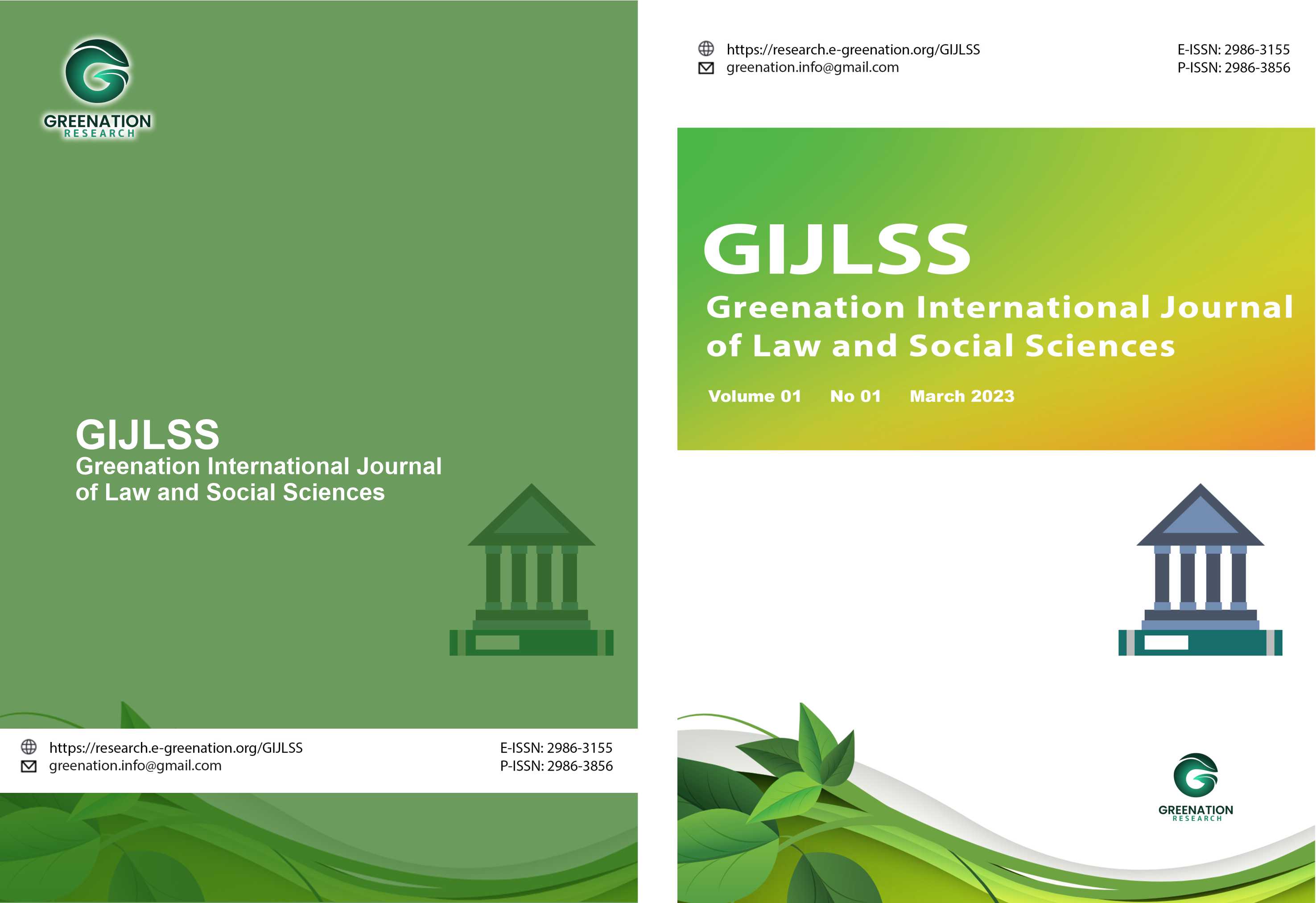Legal Implications of Applying IMO Instruments to the Protection of the Marine Environment from Pollution by Ships, Especially in Ecologically Sensitive Waters
DOI:
https://doi.org/10.38035/gijlss.v3i3.594Keywords:
IMO, Protection of the Marine Environment, Ship Pollution, Ecologically Sensitive Waters, Maritime LawAbstract
Protecting the marine environment from ship pollution is a global challenge regulated through various international legal instruments issued by the International Maritime Organization (IMO), such as the International Convention for the Prevention of Pollution from Ships (MARPOL), the Ballast Water Management Convention (BWM), the Oil Pollution Preparedness, Response and Co-operation (OPRC), and liability and compensation conventions, such as the Civil Liability Convention (CLC) and the Hazardous and Noxious Substances Convention (HNS). Indonesia, as an archipelagic country with ecologically sensitive waters, such as coral reefs, mangroves, and conservation areas, has a vital interest in integrating these provisions into national law. This study aims to analyze the legal implications of applying IMO instruments to protect the marine environment, particularly in Indonesia's ecologically sensitive waters. The research method uses a juridical-normative and conceptual approach by examining international and national laws and regulations, including Law No. 17 of 2008 concerning Shipping, as amended by Law No. 66 of 2024, Government Regulation No. 21 of 2010 concerning Maritime Environmental Protection, and Law No. 32 of 2009 concerning Environmental Protection and Management. The study shows that the ratification and implementation of IMO instruments create legal obligations for the prevention, monitoring, and enforcement of marine pollution. However, there are gaps between IMO standards and national capacity, including limited waste facilities, inter-agency coordination, and the effectiveness of sanctions. This study recommends harmonization of national regulations with IMO standards, strengthening of supervisory capacity, and the establishment of effective compensation mechanisms to ensure the protection of the marine environment in Indonesia's ecologically sensitive waters.
References
Adiputra, I. K. (2023). ANALISIS INSPEKSI PORT STATE CONTROL INDONESIA BERDASARKAN TOKYO MOU. JPB: Jurnal Patria Bahari, 3(2), 8-15.
Afandi, F. A. (2022). Penggunaan Bukti Ilmiah dan Penerapan Prinsip Kehati-hatian dalam Putusan Perkara Pidana Materiil Lingkungan Hidup di Indonesia Tahun 2009–2020. Jurnal Hukum Lingkungan Indonesia, 9(1), 77-120.
Amalya, A. R. (2020). Prinsip Ekstrateritorial Dalam Penegakan Hukum Persaingan Usaha. Jurnal Ilmiah Mandala Education, 6(1), 171-185.
Darza, S. E. (2020). Dampak pencemaran bahan kimia dari perusahaan kapal indonesia terhadap ekosistem laut. Jurnal Ilmiah Manajemen, Ekonomi, & Akuntansi (MEA), 4(3), 1831-1852.
Didik Suhariyanto, S. H. (2025). Hukum Perlindungan Lingkungan: Menegakkan Keadilan Ekologis. Jambi: PT. Nawala Gama Education.
Fathurrahim, F. &. (2024). Implementasi Perlindungan Lingkungan Maritim Atas Pencemaran Limbah Kapal Di Pelabuhan Rakyat Kota Ternate. JATISWARA, 39(2), 229-243.
Hafiuddin, A. P. (2024). Pemanfaatan Acces Right Oleh Pihak Asing Di Zona Ekonomi Eksklusif Indonesia. PROGRESIF: Jurnal Hukum, 18(1), 20-41.
Lioso, J. V. (2025). KESELAMATAN DAN KEAMANAN PELAYARAN DI LAUT MENURUT HUKUM LAUT DI INDONESIA. LEX ADMINISTRATUM, 13(2).
Maulidia, D. A. (2024). Analisis Keselamatan Dan Evaluasi Risiko Kecelakaan: Studi Kasus Kerusakan Dermaga Akibat Keputusan Olah Gerak Di Pelabuhan XYZ. Jurnal Sains dan Teknologi Maritim, 25(1), 14-28.
Nugroho, A. E. (2025). Efek Pencemaran Laut terhadap Kehidupan Biota Laut: Tinjauan Ruang Lingkup. Jurnal Laot Ilmu Kelautan, 7(1), 10-23.
Peny, M. N. (2025). Pengaruh Kerapatan Mangrove Terhadap Laju Transpor Sedimen di Kawasan Ekowisata Mangrove Oesapa Barat, Kota Kupang. Journal of Marine Research, 14(1), 105-116.
Purba, D. F. (2024). Penataan penegakan hukum maritim: Menuju Indonesia maju. Padang: CV Gita Lentera.
Purwendah, E. K. (2021). Prinsip Pencemar Membayar (Polluter Pays Principle) Dalam Sistem Hukum Indonesia. Jurnal Pendidikan Kewarganegaraan Undiksha, 9(2), 340-355.
Saidal Siburian, M. M. (2020). Pencemaran Udara dan Emisi Gas Rumah Kaca. Jakarta: Kreasi Cendekia Pustaka.
Sari, M. N. (2023). Penanganan Pencemaran Plastik Sebagai Sampah Laut (Marine Debris) Melalui Perspektif Keamanan Maritim. NUSANTARA: Jurnal Ilmu Pengetahuan Sosial, 10(4), 1664-1675.
Septiarahma, F. (2025). Kepastian Hukum dalam Pengaturan Tanggung Jawab atas Kerusakan Akibat Deep-Sea Mining di Laut Dalam. Ranah Research: Journal of Multidisciplinary Research and Development, 7(5), 3220-3228.
Silviani, N. Z. (2025). Keselamatan Kapal Perikanan: Tantangan dan Prospek Registrasi Kapal Kecil di Kepulauan Riau. Jurnal Kebijakan Sosial Ekonomi Kelautan dan Perikanan, 15(1), 1.
Sudiyanto, I. W. (2025). Ekologi dan Konservasi Lingkungan. Jambi: PT. Sonpedia Publishing Indonesia.
Widodo, B. H. (2020). Manajemen penanggulangan tumpahan minyak di laut akibat dari pengoperasian kapal. Majalah Ilmiah Gema Maritim, 22(1), 60-66.
Yuddin, N. W. (2023). Pertanggung Jawaban Perusahaan Pemilik Kapal terhadap Kasus Pencemaran Lingkungan sebagai Akibat Tumpahaan Minyak Muatan Kapal Laut di Indonesia. Syntax Idea, 5(12).
Downloads
Published
How to Cite
Issue
Section
License
Copyright (c) 2025 Agung Pratama Osmond, Suparno

This work is licensed under a Creative Commons Attribution 4.0 International License.
Copyright :
Authors who publish their manuscripts in this journal agree to the following conditions:
- Copyright in each article belongs to the author.
- The author acknowledges that the Greenation International Journal of Law and Social Sciences (GIJLSS) has the right to be the first to publish under a Creative Commons Attribution 4.0 International license (Attribution 4.0 International CC BY 4.0).
- Authors can submit articles separately, arrange the non-exclusive distribution of manuscripts that have been published in this journal to other versions (for example, sent to the author's institutional repository, publication in a book, etc.), by acknowledging that the manuscript has been published for the first time at GIJLSS.























